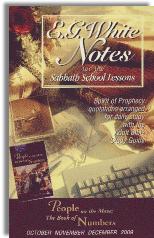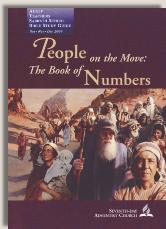|
||||||||||||||
Commentary on "Priests and Levites"
Day 4: Tuesday, November 17, 2009
Today’s lesson, Sanctuary Support, is about financial support of religious workers. Giving our hard-earned money can be a difficult decision, and one by which some strong emotions can be aroused. We must keep this in mind, particularly in our difficult economic times.
We cannot go to the Old Testament and look at the Levitical system as the model for how we support workers in a Christian Church. The author is correct in stating that eleven tribes would support the one tribe of Levites as they worked in the sanctuary. This cannot be directly transferred to the New Testament Church. If the Levitical priesthood is no longer functioning, we must first understand the New Testament priesthood and then identify how the Lord asks us to provide for those in full-time ministry.
The model that Jesus provided in his life and ministry must be looked at first. He put twelve men into intensive training and full-time ministry. As part of their training Jesus sent them out in groups of two, and other disciples in groups of seventy. He taught them to rely only on what God provided them for sustenance, even returning to Caesar that which was Caesars (Mark 12:17).
Following Jesus’ earthly life and ministry, after his ascension to heaven, the Holy Spirit was poured into the new Church on the day of Pentecost. The New Testament records how the new Christian Church grew and developed systems of support for those involved in the ministry (2 Cor. 11:8-9; Acts 20:34), as well as support for anyone who had needs (Acts 2:44-45; 1 Jn. 3:11-20), particularly orphans and widows (Acts 6:1-6; 1 Tim. 5:16; James 1:27).
Every Christian is a member of the Priesthood of all believers. If we follow the model of the Levitical system, we simply give our earnings to ourselves, since we are the priests, yet this is not the New Testament model. The New Testament model is to give offerings to support those in full-time ministry, give to other Christians who are in need and support widows and orphans. We are neither bound nor limited by a tithe. The ten percent tithe is often easily accepted but generally not fully understood. Perhaps a good place to start would be with a wonderful study on the subject of Christians and tithing which can be found at the following link: http://lifeassuranceministries.org/Proclamation2004_MarApr.pdf and go to page 5 to begin the study.
The statement in the lesson that the priesthood in Israel was one in which the priests “served as intermediaries between God and the people” misses the fact that we have no such priesthood in the New Testament. Also, his statement that “the priesthood constantly was reminded of their obligation to serve these people faithfully and not to take advantage of the position that they had been given” implies that we are to trust those to whom we give, and that giving will remind them not to abuse their position.
Unfortunately, this kind of thinking is rampant within Christianity. Within the Seventh-day Adventist Church itself there have been abuses by individuals in positions of authority over the lifetime of the Church. As these abuses have been investigated and written about, many individuals within the Adventist Church have begun to divert their financial support to other ministries.
Also, just because we are to support those who are in full-time ministry has never meant that we are free from our responsibility to our brothers and sisters in Christ, or to widows and orphans. In thinking that our leadership will also take care of people in need disregards the clear New Testament teaching found in First John and James that those who are blessed materially should help those who are in need.
When giving substantial amounts to organizations, we must hold those organizations accountable for their actions with the money with which they are entrusted. If they violate that trust, they should not be supported by further tithes and offerings by those who truly want to serve God. (The Davenport scandal, the Folkenberg crisis, and the revelations of the former General Conference Chief Auditor David Dennis should provide more than enough caution to anyone who thinks that blindly supporting Church leadership is the right thing to do.)
(Please note, giving to an organization and giving to an individual in need, such as one with a cardboard sign at a freeway off ramp, are very different situations. When giving money continuously to an organization, we need to know what is being done with those large amounts of money. When giving money to a needy person, the Lord may lead each one of us in different ways to provide food, shelter or clothing to those individuals.)
If we believe that there is only one true Church (Remnant) on earth, then that may limit how we support God’s work. If we believe that God works through many individuals and is not limited by denominational distinctives, then we should follow the leading of the Holy Spirit and give as we are led by the Lord. Although this may be uncomfortable for some, as Christians we are commanded to follow the leading of the Holy Spirit in our lives and not allow the desires of greedy individuals or organizations to dictate how we support God’s work.
If you are giving your hard-earned money to a corrupt organization and not supplying the needs of your brother or sister in Christ who are in need, you are violating the teaching of Christ and his apostles. Open your heart to the leading of the Holy Spirit in this regard and you will truly find blessings beyond compare. (These blessings are not the “Malachi chapter four” type of blessings, which may end up being, for Christians, a selfish way of looking at giving. They will be the blessings of being a part of something beyond which we are capable of imagining.)
Summary
- Supporting the Levitical priesthood and Church leadership are not the same. The priesthood has changed and we no longer give to the priesthood, but to those in need as well as those in full-time ministry.
- As Jesus trained the Apostles and disciples, he showed them how to rely on God for all their needs, and gave them practical experience when sending them out in groups of two and groups of seventy.
- We are not asked to blindly support those in positions of authority, particularly when they have violated the trust due those positions.
- As Christians, we are to support those in full-time ministry, supply for our brothers and sisters who are in need, and take care of widows and orphans. We should not rely on those in full-time ministry to take on our responsibilities to take care of those in need.
- Our belief regarding the Remnant may dictate how free we are to follow the leading of the Holy Spirit to give to those in need as well as support honorable Christian ministries.
- The Davenport and Folkenberg scandals, as well as the revelations of former General Conference Chief Auditor David Dennis should provide a strong caution for giving blindly to any organization.
- We must not give, and then expect a “Malachi chapter four” type of blessing. For the Christian this can be a selfish way of giving. Our offerings should be given with the knowledge that our blessings will be something beyond that which we are able to imagine.
GO TO DAY 5
Copyright 2009 BibleStudiesForAdventists.com. All rights reserved. Revised November 12, 2009. This website is published by Life Assurance Ministries, Glendale, Arizona, USA, the publisher of Proclamation! Magazine. Contact email: BibleStudiesForAdventists@gmail.com.
The Sabbath School Bible Study Guide and the corresponding E.G. White Notes are published by Pacific Press Publishing Association, which is owned and operated by the Seventh-day Adventist church. The current quarter's editions are pictured above.
Official Adventist Resources
Standard Edition Study Guide Week 8
Teacher's Edition Study Guide Week 8
Easy Reading Edition Study Guide Week 8
Search the Complete Published Ellen G. White Writings


